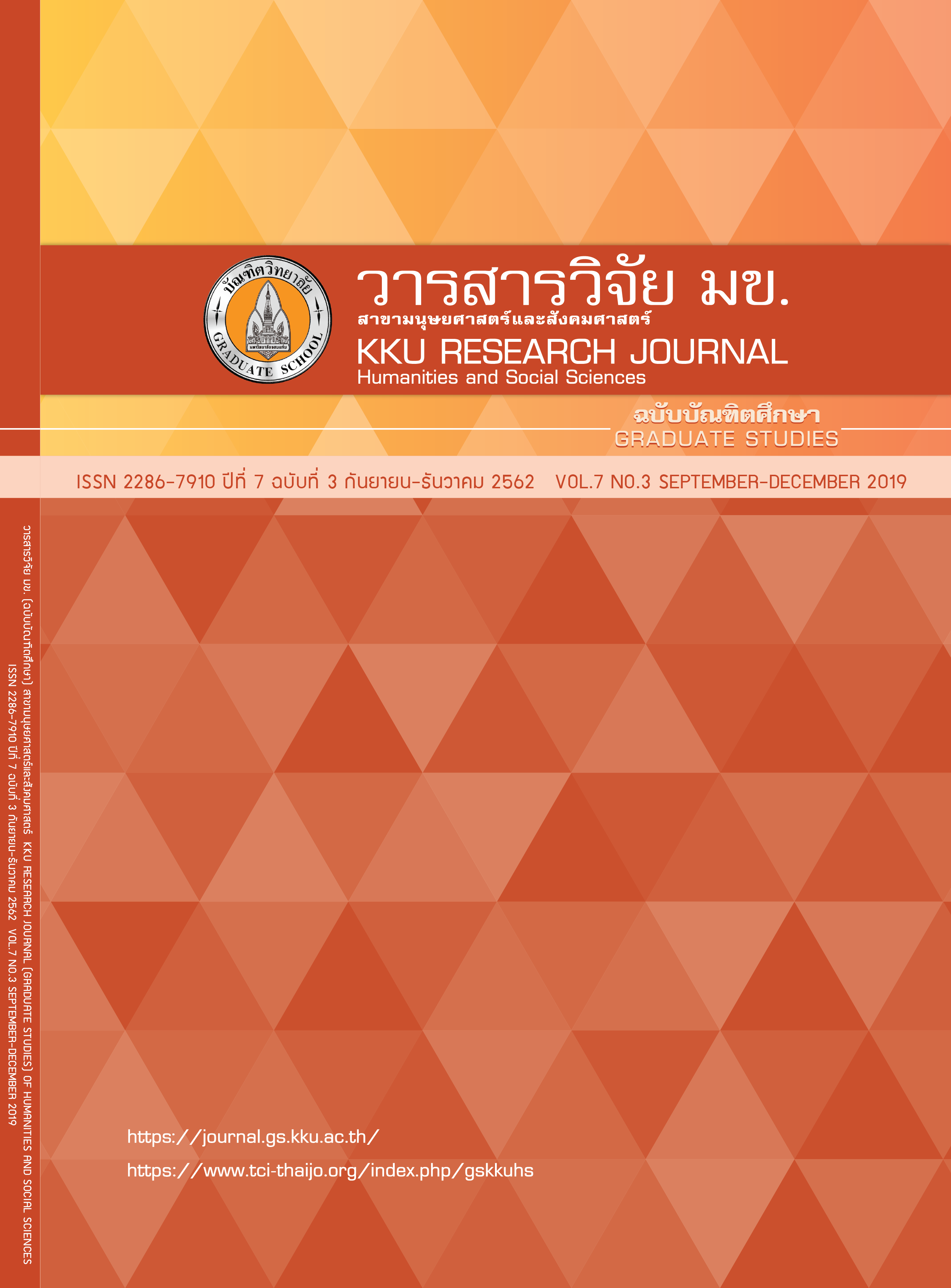การส่งเสริมการรับรู้ความสามารถของตนเองกับกิจกรรมการเรียนการสอน
คำสำคัญ:
การรับรู้ความสามารถตนเอง, ปัจจัยส่งผลต่อการรับรู้ความสามารถตนเอง, กิจกรรมการเรียนการสอนส่งเสริมการรับรู้ความสามารถของตนเองบทคัดย่อ
บทความนี้มีวัตถุประสงค์อธิบายความสำคัญของการรับรู้ความสามารถของตนเองของผู้เรียนที่กล่าวถึงกิจกรรมการเรียนการสอนที่ส่งเสริมต่อการรับรู้ความสามารถของตนเองเพื่อการรับรู้ผู้เรียนในระดับที่เพิ่มขึ้น ส่งผลทำให้ผู้เรียนมีความอดทนในกิจกรรมการเรียน และมีความพยายามที่จะทำให้ตนเองประสบผลสำเร็จ การส่งเสริมการรับรู้ความสามารถของตนเองมีผลต่อพฤติกรรมผ่านกระบวนการในแต่ละด้าน ดังนี้ 1) กระบวนการคิด (Cognitive Process) 2) กระบวนการจูงใจ (Motivation Process) 3) กระบวนการด้านอารมณ์ (Affective Process) 4) กระบวนการเลือก (Selection Process) และมีปัจจัยที่จะส่งผลต่อการพัฒนาการรับรู้ความสามารถตนเองของผู้เรียน ดังนี้ 1) ประสบการณ์ที่ประสบผลสำเร็จ (Mastery Experiences) 2) การใช้ตัวแบบ (Modelling) 3) การใช้คำพูดชักจูง (Verbal Persuasion) 4) การกระตุ้นทางอารมณ์ (Emotional Arousal) รูปแบบการประเมินระดับการรับรู้ความสามารถตนเอง ดังนี้ 1) มิติระดับความยากและความซับซ้อนของงาน (Magnitude) 2) มิติระดับความมั่นใจของบุคคล (Strength) 3) มิติระดับการสรุปโดยนัยสู่งานอื่น (Generality) ส่งผลให้มีกิจกรรมการเรียนการสอนที่ส่งเสริมการรับรู้ความสามารถตนเอง เช่น กิจกรรมใบงาน แบบฝึกหัดที่มีตัวอย่างใกล้เคียงให้กับผู้เรียน การมีคลังข้อมูลส่งเสริมการให้กำลังใจผู้เรียน กิจกรรมศึกษาบุคคลต้นแบบ กิจกรรมการสื่อสารด้วยคำพูดเพื่อให้กำลังใจ ให้คำปรึกษากับผู้เรียนในการปฏิบัติงานให้ประสบผลสำเร็จ
เอกสารอ้างอิง
[Internet]. 2017 Retrieve 19 August 2018, from: http://www.libarts.up.ac.th/v2/img /
Thailand-4.0.pdf
2. Bandura A. Self-efficacy: The exercise of control. New York: W.H. Freeman; 1997.
3. Bandura A. A Social Foundation of thought and action. A Social Cognitive Theory.
N.J.: Prentice-Hall; 1986.
4. Iamsupasit S. Theories and techniques in behavior modification. 10th ed.
Bangkok: Chulalongkorn University; 2013.
5. Jumpadee N. Effect of Self-Efficacy, Creative Styles and Individual Factor to
Innovative Work Behavior: A Case Study of a Software House
[Master degree thesis]. Bangkok: Thammasat University; 2011.
6. Bandura A. Social learning Theory. Englewood Chiffs, N.J.: Prentice Hall; 1977.
7. Lee C. Bobco P. Self-efficacy Beliefs: Comparision of Five Measur.
Journal of Applied Psychology. 1994; 79(4): 364-369.
8. Kultawanich K. A learning system on cloud-base virtual classrooms
base on a connectivism learning concept to enhance information literacy
and information literacy self-efficacy of undergraduate students [PhD thesis].
Bangkok: Chulalongkorn University; 2014.
9. Khunrit B. The Academic Self-Efficacy and Adversity Quotient of Student
in Program Business Computer, SuanDusit University, Trang Center.
The 7th Hatyai National and International Conference [Internet]. 2016
[cited 2018 October 3]; 1055-1064. Available from: http://rd.hu.ac.th/
10. Gibson JL, Ivancevich JM, Donnelly JH, Jr. Organizations Behavior,
structures, process. 10th ed. New York: McGraw-Hill; 2000.




